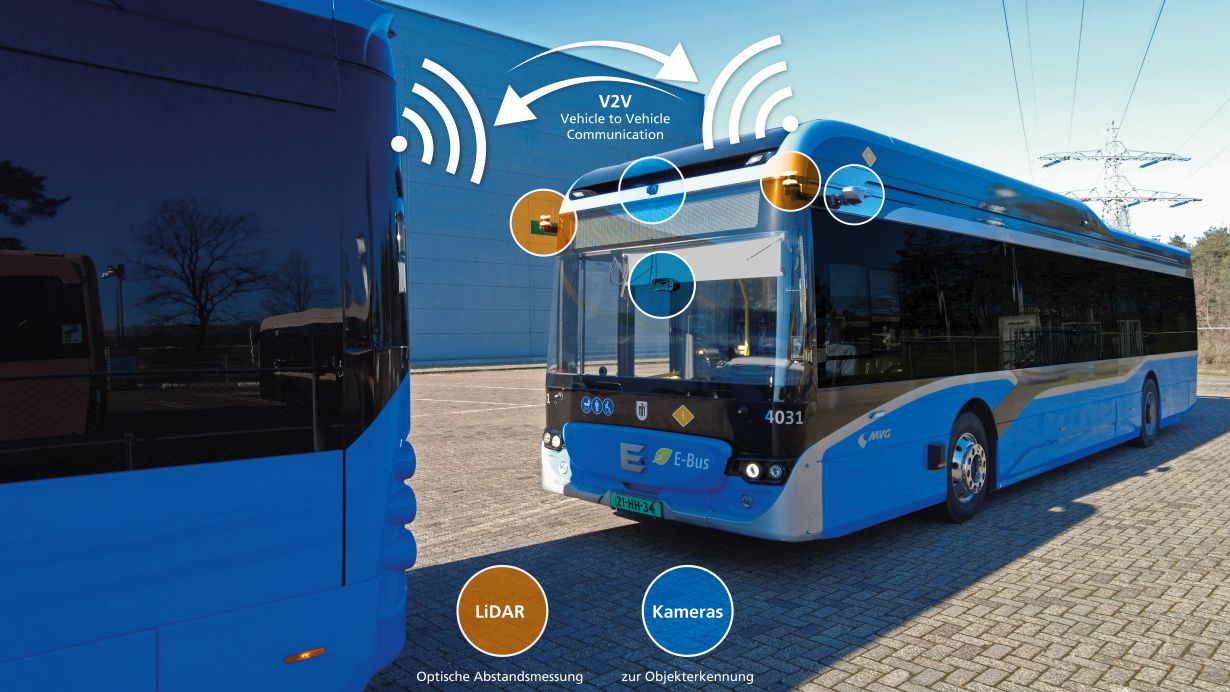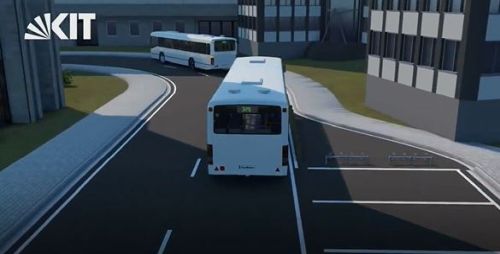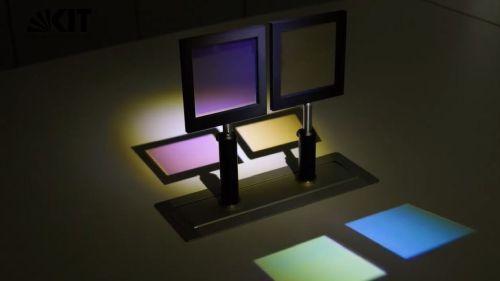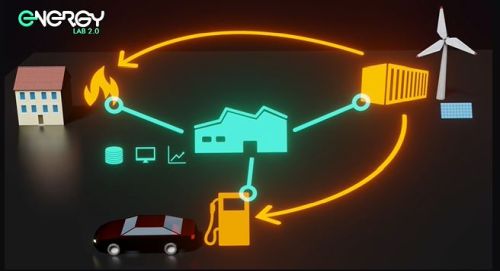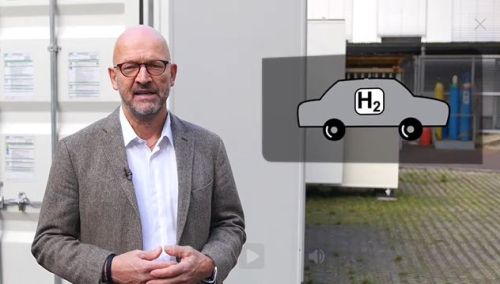Automated public passenger transit, optical filters from the inkjet printer, and a smart test field for tomorrow’s energy systems: These and other innovations will be presented by Karlsruhe Institute of Technology (KIT) at Hannover Messe from April 17 to 21, 2023. KIT’s work will be highlighted in particular at its two main stands at “Future Hub” (Hall 2, Stand B45) and “Energy Solutions” (Hall 13, Stand C70). Latest mobility research projects will also be presented at the stand of Baden-Württemberg International (Hall 12, Stand D15). On the Startup Area (Hall 17, Stand A62), ten startups of KIT will introduce themselves.
Information on the KIT stands and exhibits at Hannover Messe can also be found in the digital press kit.
“In time of crises, innovations are in higher demand than ever,” says the President of KIT, Professor Holger Hanselka. “The researchers of KIT are rising to this challenge. They are assuming responsibility and are making major contributions to resource-preserving and climate-friendly energy supply, mobility, industry, and digitalization.” The concepts and projects presented at the 2023 Hannover Messe show that KIT’s interdisciplinary research is excellently prepared for coping with the tasks of the present and future.
KIT at “Future Hub“ (Hall 2, Stand B45)
At “Future Hub,“ KIT and FZI Research Center for Information Technology, an innovation partner of KIT, will present their projects at a joint stand.
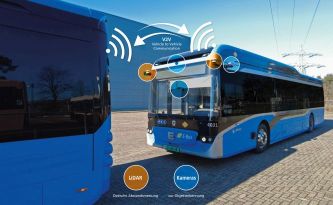
be connected or operated separately
again. (ITIV, KIT)
The TEMPUS Project: Automated Driving in Public Transport
In the TEMPUS project, researchers are implementing a bus platoon on the test field for automated and connected driving in the urban area of Munich. Platooning means that several buses are connected by an electronic drawbar and follow each other at close distance. Whenever necessary, buses can be connected or operated separately again. Platooning is economically and ecologically attractive, as it helps respond to fluctuating numbers of passengers. Moreover, it represents another milestone on the way towards fully automatic driving.
Video "Automatisiertes Fahren im ÖPNV" (in German)

precise control of optical properties. (LTI, KIT)
IJPOFs: Inkjet Printed Optical Filters
Whether machine vision, AR and VR technologies, autonomous driving, medical inspection, or laser material processing: Many applications require optical filters, which block or amplify a certain part of the spectrum. Inkjet Printed Optical Filters (IJPOFs) allow for a reduction of manufacturing costs and increase in customization flexibility: Inkjet printing facilitates manufacturing of optical filters with the properties required in the desired locations and sizes.
Video "Optische Filter aus dem Tintenstrahldrucker" (english subtitles)
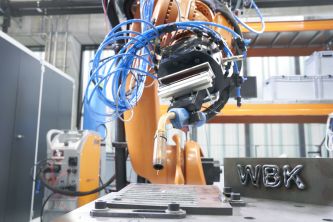
intelligent production and disassembly systems.
(Amadeus Bramsiepe, KIT)
SDMBot: Software-based Process Empowerment for Industrial Robots
Software-based empowerment of robots in industry requires simulation tools that model the entire manufacturing process in a virtual environment. This includes robots, tools, and materials. For the open source software tools presented, robot simulations were extended to include process models such as milling, welding, or painting. The simulation enables problems and weak points to be identified and eliminated in advance, which contributes to a better quality of the final process.
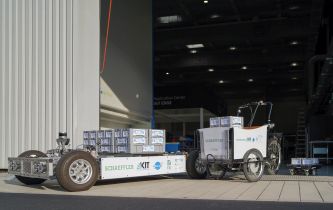
and industry are working on solutions for the
mobility of people and goods.
(Alexander Seiffer, Schaeffler)
FLOOW: New Mobility Solutions Using AI
Artificial Intelligence (AI) is used to develop energy-efficient and safe solutions for passenger and freight transport. Work focuses on the robust and precise localization of mobility systems, generalized environment recognition, and maneuver planning on specialized hardware. The FLOOW project is presented by KIT and FZI Research Center for Information Technology, an innovation partner of KIT. Project partners are the navigation technologies company ANAVS and automotive supplier SCHAEFFLER.
Research to Business – Technology Offers of KIT
At the Future Hub stand, visitors may also obtain information on 42 latest innovations made by KIT that may be turned into marketable products and processes together with interested external cooperation partners.
KIT at “Energy Solutions“ (Hall 13, Stand C70)
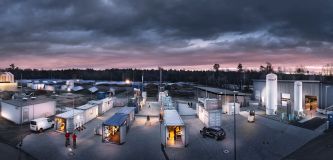
structure for renewable energy research
in Europe.
(Amadeus Bramsiepe/Markus Breig, KIT)
Energy Lab 2.0: Test Field for Future Energy Systems
Europe’s largest infrastructure for renewable energy focuses on the intelligent networking of environmentally compatible options to generate, store, and supply energy. At Hannover Messe, researchers will provide information on the following topics in particular:
Video "Energy Lab 2.0" (in German)
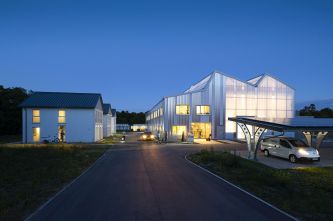
technologies into the energy system
under real conditions.(Markus Breig, KIT)
Energy System – Grids – Simulation
Coupling of the different energy sectors and fluctuation of energy production from renewable sources are major challenges in control. To simulate control and monitoring tasks as closely to reality as possible, the Smart Energy System Simulation and Control Center (SEnSSICC) is part of the Energy Lab 2.0. SEnSSICC is the “brain” of the Energy Lab and pools IT-related activities and research. SEnSSICC collects all information from the different systems and partners. Measurement currents are stored, controlled, analyzed, and visual¬ized. Based on the findings obtained, further energy systems can be simulated. In this way, the real energy world – e.g. on the adjacent photovoltaic field and in the corresponding battery storage systems – is connected with the virtual energy world.
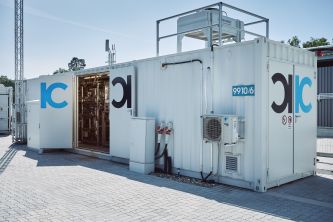
renewable sources can be used, for example,
to produce synthetic fuels. (Cynthia Ruf, KIT)
Power-to-X: Methanation and E-fuels
For the energy transition to be successful, the renewable power sector must be coupled with other energy sectors. In the area of chemical energy carriers, such as fuels and combustibles, this can be achieved using power-to-X approaches (P2X). In this case, synthetic chemical energy carriers are produced from hydrogen and CO2. If hydrogen is produced by electrolysis with green electricity and CO2 comes from a non-fossil source, the P2X products are nearly CO2-neutral. Research at the Energy Lab 2.0 covers the correspond¬ing plants. A Power-to-Liquid container produces so-called e-fuels, the Power-to-Gas plant generates climate-neutral methane for later power production by a gas turbine. Video "Power-to-X" (english subtitles)
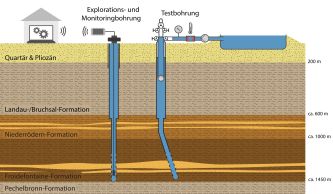
the technical feasibility and efficiency of a
high-temperature heat storage system.
(INE, KIT)
DeepStor: Generating and Storing Geothermal Heat throughout the Year
KIT’s Campus North is located in the geothermally relevant Upper Rhine Graben and, hence, possesses great potential for sustainable heat supply. Within the DeepStor project, researchers test a high-temperature aquifer storage system that is loaded in summer and unloaded in winter. The experimental setup allows for the execution of experiments to load and unload the storage system as well as for the investigation of the associated thermal, hydraulic, chemical, and mechanical processes in the thermal water cycle. Having demonstrated the feasibility, it is planned to integrate for research a high-temperature aquifer storage system in the existing heat grid of KIT’s Campus North.
Research to Business – Technology Offers of KIT
At the Future Hub stand, visitors may also obtain information on 30 innovations made by KIT that may be turned into marketable products and processes together with interested external cooperation partners.
KIT at Other Stands
A number of other current topics will be presented by KIT and partners at the stand of Baden-Württemberg International (Hall 12, Stand D15).
The Innovation Campus Future Mobility (ICM) of KIT and the University of Stuttgart will provide insight into cutting-edge research for sustainable and digitalized production and mobility. The DeVee demonstrator, a light electric vehicle, presents several subsystems of a future vehicle concept that can be experienced by visitors both in reality and immersively as a virtual twin. The live visualization of a transverse flux machine shows how magnetic fields behave in a complex electric motor.
Within CELEST, KIT, together with Ulm University and the Center for Solar Energy and Hydrogen Research Baden-Württemberg (ZSW), works on electrochemical energy storage, with activities ranging from fundamental research to technical application. At the 2023 Hannover Messe, researchers will present new battery materials in elemental form, various cell types, and a Scara robot, including an electrode magazine and gripper, for stacking pouch cells.
INERATEC, a startup of KIT, is a pioneer in the area of power-to-liquid applications. The company produces sustainable fuels and chemical products. In its modular chemical plants, hydrogen from renewable power and greenhouse gases, such as CO2, are converted into e-kerosene, CO2-neutral gasoline, clean diesel, synthetic waxes, methanol, or SNG. The paramount goal is to defossilize mobility and chemical industry and to protect the climate.
At the stand of the Federal Ministry of Education and Research (Hall 2, Stand A22), KIT’s wbk – Institute of Production Science presents work at its KARL competence center (in German). There, wbk studies how AI-based assistance systems for production staff influences their work. The Kinemic Band Wearable, for instance, uses an integrated AI tool to recognize screwing processes from characteristic vibrations of the wrist. The band supports production staff and enhances safety of production processes. This technology may be transferred to other tools or working steps.
Ten startups of KIT supported by the KIT Founders Forge will present themselves on the Startup Area (Hall 17, Stand A62). The fields covered range from antibacterial surfaces for implants to a modular transportation system to innovative and robust AI solutions to sensors for smart homes to hydrogen technologies. Every day of Hannover Messe, two startups will present themselves: EFFECT and Nanoshape GmbH (April 17), Formic and RevoAI GmbH (April 18), Aimino GmbH and Respeak GmbH (April 19), Prenode and SemorAI GmbH (April 20), and Inventife and Revyve (April 21).
KIT in the Conference Program
Tech Transfer Conference Stage (Hall 2, Stand A60)
Monday, April 17, 2023, 11.25 hrs: Softwaredefinierte Prozessplanung für die robotische Fertigung der Zukunft (software-defined process planning for future robot-based manufacture)
Alexander Puchta, wbk Institute of Production Science of KIT
Monday, April 17, 2023, 14:50 hrs: Innovation und Transfer – Chancen und Herausforderungen für den Mittelstand (innovation and transfer - opportunities and challenges for SMEs)
Panel discussion with, among others, Bettina Stark-Watzinger (German Federal Minister of Education and Research), Professor Holger Hanselka (President of KIT), and further representatives from politics and business
Tuesday, April 18, 2023, 9.55 hrs: Machine Learning für KMU aus der Produktionstechnik: Praxisnahes Deployment von ML-Modellen (machine learning for SMEs in the area of production technology: Close-to-practice deployment of ML models)
Imanuel Heider, wbk Institute of Production Science of KIT
Wednesday, April 19, 2023, 9.30 hrs: Aquiferspeichern für eine nachhaltige Wärme- und Kälteversorgung in Deutschland (aquifer thermal energy storage (ATES) for sustainable heat and cooling supply in Germany)
Professor Philipp Blum, Institute of Applied Geosciences of KIT
Thursday, April 20, 2023, 13.30 hrs: Panel: KI2Business – Paradies oder Irrweg? (AI2Business – Is it the way to paradise or the wrong track? A simultaneous translation into English will be provided.)
Artificial intelligence (AI) is no longer a vision. It has long been part of industry and everyday life. Deep neural networks are being used very successfully to detect and localize workpieces or even anomalies in machine data. But do companies already trust AI and its decisions to such an extent that it can be used without restriction? Apart from the many opportunities and possible uses of AI in the industrial sector, we will also discuss the risks associated with AI. This will also include ways in which companies can protect themselves against damage caused by disinformation. Participants: Professor Jürgen Fleischer, Professor Michael Decker (beide KIT), Dr. Arne Rönnau und Dr. Jonas Fegert (beide FZI). Moderation: Dr. Stefan Schwab (FZI). Presented by: Dr. Stefan Schwab (FZI).
Special Events
Tuesday, April 18, 2023, 13:00 hrs: Technologieführerschaft ‘Made in Germany’ (technology leadership ‘Made in Germany’)
Keynotes and panel with, among others, Professor Siegfried Russwurm (President of BDI), Dr. Robert Habeck (German Federal Minister for Economic Affairs and Climate Action), Professor Holger Hanselka (President of KIT), and further representatives from politics and business. Livestream
Public Forum (Hall 13)
Wednesday, April 19, 2023, 12:20-12:40 hrs: Offshore-Production of green hydrogen and other Power-to-x products.
Event of the Hydrogen Flagship Project H2Mare with Prof. Roland Dittmeyer of the KIT Institute of Micro Process Engineering and Matthias Müller of Siemens Energy
Battery Live Talk (Hall 2, Stand A30)
Monday, April 17, 2023, 16:30-17:30 hrs: How significant is the mechanical engineering sector for a competitive battery industry in Europe?
Event at the stand of the German Federal Ministry for Economic Affairs and Climate Action, with, among others, Professor Jürgen Fleischer, wbk Institute of Production Science at KIT. (Also online, free registration: https://www.ipcei-batteries.eu/accompanying-research/events/battery-live-talk-apr-23)
For further informationen:
Research Magazine lookKIT: Sustainable Technologies for Humans
The innovative and smart technologies presented by KIT at Hannover Messe 2023 also are in the focus of the latest issue of lookKIT, the research magazine of KIT. Under the title of “Energieeffizient und Autonom: Nachhaltige Technologien für den Menschen“ (Energy-efficient and Autonomous: Sustainable Technologies for Humans), it offers information on KIT’s work in a number of interviews and contributions (in both German and English).
Digital Press Kit of KIT for the 2023 Hannover Messe
In close partnership with society, KIT develops solutions for urgent challenges – from climate change, energy transition and sustainable use of natural resources to artificial intelligence, sovereignty and an aging population. As The University in the Helmholtz Association, KIT unites scientific excellence from insight to application-driven research under one roof – and is thus in a unique position to drive this transformation. As a University of Excellence, KIT offers its more than 10,000 employees and 22,800 students outstanding opportunities to shape a sustainable and resilient future. KIT – Science for Impact.

